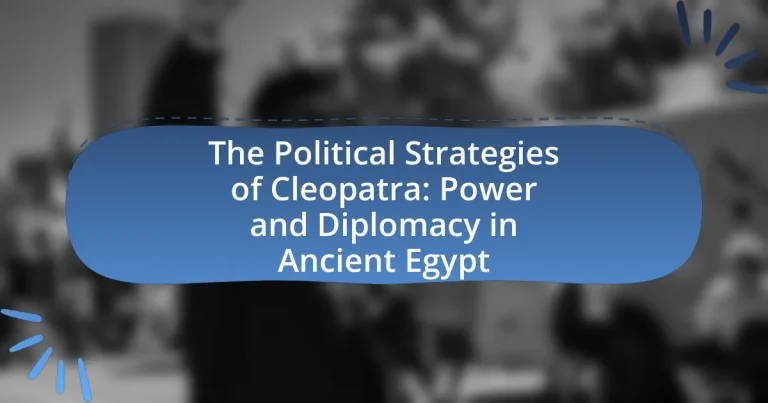The main entity of the article is Cleopatra, the last active ruler of the Ptolemaic Kingdom of Egypt. The article examines Cleopatra’s political strategies, highlighting her formation of strategic alliances with powerful Roman leaders such as Julius Caesar and Mark Antony, which were crucial for maintaining her reign and Egypt’s independence amidst Roman expansion. It discusses her adept use of diplomacy, image management, and the challenges she faced, including internal conflicts and external pressures from Rome. The analysis also explores the long-term effects of her strategies on Egypt’s political landscape and governance, as well as the lessons modern leaders can learn from her approach to power and diplomacy.
What were Cleopatra’s main political strategies in ancient Egypt?
Cleopatra’s main political strategies in ancient Egypt included forming strategic alliances, leveraging her relationships with powerful Roman leaders, and utilizing her intelligence and charisma to maintain her rule. She aligned herself with Julius Caesar, which helped her regain the throne after being ousted, and later formed a partnership with Mark Antony to strengthen her position against rival factions. Cleopatra’s ability to navigate the complex political landscape of the time, including her adept use of diplomacy and cultural integration, reinforced her authority and aimed to secure Egypt’s independence amidst Roman expansion. Historical records indicate that her relationships with these leaders were not only personal but also politically motivated, as they provided military support and resources crucial for her reign.
How did Cleopatra utilize alliances to strengthen her power?
Cleopatra utilized alliances primarily through strategic relationships with powerful Roman leaders, notably Julius Caesar and Mark Antony, to enhance her political influence and secure her reign in Egypt. By forming a romantic and political alliance with Julius Caesar, she gained military support that helped her reclaim the throne from her brother Ptolemy XIII. Following Caesar’s assassination, Cleopatra aligned with Mark Antony, which provided her with additional military backing and resources, further solidifying her power. This alliance was marked by the famous Battle of Actium, where Antony’s forces, bolstered by Cleopatra’s support, sought to challenge Octavian’s rise. Cleopatra’s ability to navigate these alliances demonstrated her diplomatic acumen and her understanding of the geopolitical landscape of the time, ultimately aiming to restore Egypt’s prominence in the Mediterranean.
What key alliances did Cleopatra form with Roman leaders?
Cleopatra formed key alliances with Roman leaders Julius Caesar and Mark Antony. Her relationship with Julius Caesar began in 48 BCE when she sought his support to regain her throne in Egypt, leading to a political and romantic alliance that solidified her power. Following Caesar’s assassination in 44 BCE, Cleopatra aligned with Mark Antony, with whom she had three children. This alliance was strategic, as Antony sought to expand his influence in the eastern Mediterranean, and Cleopatra aimed to secure her position against rival factions in Rome. Their partnership culminated in the naval Battle of Actium in 31 BCE, which ultimately led to their downfall, but it exemplified Cleopatra’s diplomatic efforts to leverage Roman power for her own ends.
How did these alliances impact her reign and Egypt’s stability?
The alliances Cleopatra formed significantly strengthened her reign and contributed to Egypt’s stability. By aligning with powerful Roman leaders such as Julius Caesar and Mark Antony, Cleopatra secured military support and political legitimacy, which were crucial for maintaining her throne amid internal and external threats. For instance, her relationship with Caesar helped her regain the throne after being ousted, while her alliance with Antony aimed to counteract the growing influence of Octavian, ensuring Egypt’s sovereignty during a tumultuous period. These strategic partnerships not only bolstered her power but also provided a buffer against potential invasions, thereby enhancing Egypt’s political stability during her rule.
What role did diplomacy play in Cleopatra’s political maneuvers?
Diplomacy was central to Cleopatra’s political maneuvers, enabling her to secure alliances and maintain power in a tumultuous political landscape. Cleopatra utilized diplomatic relationships with powerful Roman leaders, such as Julius Caesar and Mark Antony, to bolster her position in Egypt and expand her influence. For instance, her liaison with Caesar not only solidified her rule after the death of her brother Ptolemy XIII but also resulted in military support that helped her reclaim her throne. Additionally, her alliance with Antony through both political and romantic means aimed to counteract the growing power of Octavian, showcasing her strategic use of personal relationships to achieve political ends. These diplomatic efforts were crucial in navigating the complexities of Roman politics and securing Egypt’s autonomy during her reign.
How did Cleopatra’s diplomatic skills influence her relationships with neighboring states?
Cleopatra’s diplomatic skills significantly enhanced her relationships with neighboring states by enabling her to form strategic alliances and negotiate favorable terms. Her ability to engage with powerful leaders, such as Julius Caesar and Mark Antony, allowed her to secure military and economic support for Egypt. For instance, her liaison with Caesar not only solidified her position on the throne but also brought Roman military backing against her rivals. Additionally, her relationship with Antony was marked by mutual interests, as they sought to counter the growing power of Octavian. Cleopatra’s adeptness in diplomacy was evident in her use of marriage alliances and political negotiations, which helped maintain Egypt’s influence in the region during a tumultuous period.
What were the outcomes of Cleopatra’s diplomatic efforts?
Cleopatra’s diplomatic efforts resulted in significant political alliances and military support, particularly with Rome. Her relationships with Julius Caesar and later Mark Antony were pivotal in securing her position as the ruler of Egypt and in attempting to expand her influence. For instance, her alliance with Caesar led to the restoration of her throne after being ousted, and their union produced a son, Caesarion, which strengthened her claim to power. Additionally, her partnership with Antony aimed to challenge Octavian’s rising power, although it ultimately led to her downfall after their defeat at the Battle of Actium in 31 BCE. These outcomes illustrate the dual nature of her diplomacy, achieving short-term gains while also setting the stage for long-term consequences.
How did Cleopatra’s image and propaganda contribute to her political strategies?
Cleopatra’s image and propaganda were crucial to her political strategies, as they helped to establish her authority and influence both domestically and internationally. By portraying herself as the reincarnation of the goddess Isis, Cleopatra aligned her rule with divine legitimacy, which was essential for maintaining power in a patriarchal society. Additionally, her relationships with powerful Roman leaders, such as Julius Caesar and Mark Antony, were strategically publicized to enhance her political standing and secure military support. Historical records indicate that her lavish displays of wealth and intellect, including her famed banquets and eloquent speeches, were designed to captivate and manipulate public perception, thereby reinforcing her position as a formidable leader.
What methods did Cleopatra use to craft her public persona?
Cleopatra crafted her public persona through a combination of strategic alliances, theatrical displays, and cultural assimilation. She formed political alliances with powerful Roman leaders, such as Julius Caesar and Mark Antony, to enhance her influence and legitimacy. Cleopatra also utilized elaborate public appearances, often dressing in ways that emphasized her royal status and Egyptian heritage, which included adopting the attire of the goddess Isis to project divine authority. Additionally, she promoted her image as a learned and cultured ruler by engaging in intellectual discourse and showcasing her knowledge of various subjects, which appealed to both her Egyptian subjects and Roman allies. These methods were effective in solidifying her power and maintaining her position in a male-dominated political landscape.
How did her image affect her political relationships?
Cleopatra’s image significantly influenced her political relationships by enhancing her allure and authority, which she strategically used to forge alliances. Her portrayal as a goddess and a powerful ruler attracted key figures like Julius Caesar and Mark Antony, allowing her to secure military and political support. Historical accounts, such as those by Plutarch, illustrate how her carefully crafted image, including her intelligence and charisma, played a crucial role in establishing and maintaining these vital relationships, ultimately impacting the political landscape of her time.

What challenges did Cleopatra face in her political strategies?
Cleopatra faced significant challenges in her political strategies, primarily due to the complex political landscape of the time. The Roman Republic’s expansion posed a direct threat to her rule in Egypt, as powerful Roman leaders like Julius Caesar and later Mark Antony sought to exert influence over her kingdom. Additionally, Cleopatra had to navigate internal dissent within Egypt, including opposition from her own family and rival factions that questioned her legitimacy and authority. The shifting alliances and power dynamics in Rome further complicated her efforts, as she needed to secure support from influential Roman figures while maintaining her sovereignty. Historical accounts indicate that her relationships with these leaders were both strategic and personal, highlighting the precarious balance she had to maintain to protect her reign and Egypt’s interests.
What internal conflicts threatened Cleopatra’s rule?
Internal conflicts that threatened Cleopatra’s rule included power struggles with her siblings, particularly her brother Ptolemy XIII, and the political instability within Egypt. Cleopatra faced significant challenges as she co-ruled with Ptolemy XIII, who sought to undermine her authority, leading to a civil war that ultimately forced her to flee Alexandria. Additionally, the internal divisions among the Egyptian elite and the influence of external powers, such as Rome, exacerbated the instability. Historical accounts indicate that these conflicts culminated in the Siege of Alexandria, where Cleopatra’s position was severely jeopardized, highlighting the precarious nature of her reign amidst internal discord.
How did Cleopatra address opposition within her court?
Cleopatra addressed opposition within her court through strategic alliances, manipulation, and political acumen. She often formed alliances with powerful figures, such as Julius Caesar and Mark Antony, to strengthen her position and counteract dissent. Cleopatra also utilized her charm and intelligence to win over potential rivals and maintain loyalty among her supporters. Historical accounts indicate that she was adept at navigating the complex dynamics of her court, employing both diplomacy and, when necessary, coercion to eliminate threats to her rule. For instance, her relationships with influential Roman leaders not only secured military support but also helped to marginalize dissenting voices within her own ranks.
What role did her family dynamics play in her political challenges?
Cleopatra’s family dynamics significantly influenced her political challenges, particularly through the power struggles and alliances within the Ptolemaic dynasty. The internal conflicts, such as the rivalry with her brother Ptolemy XIII, who was initially co-regent, created a tumultuous political environment that forced Cleopatra to navigate complex familial relationships to secure her position. Historical accounts indicate that her family’s history of sibling rivalry and political intrigue, including the assassination of her father Ptolemy XII, shaped her strategies for maintaining power and forming alliances, notably with Julius Caesar and Mark Antony. These alliances were essential for her survival and the stability of her reign, demonstrating how her family’s dynamics directly impacted her political maneuvers and challenges.
How did external pressures from Rome influence Cleopatra’s strategies?
External pressures from Rome significantly influenced Cleopatra’s strategies by compelling her to form alliances and engage in political maneuvering to secure her throne and Egypt’s autonomy. Faced with the growing power of Rome, Cleopatra aligned herself with influential Roman leaders, such as Julius Caesar and later Mark Antony, to bolster her position against internal and external threats. This strategic partnership was evident when she traveled to Rome with Caesar, showcasing her political acumen and willingness to leverage Roman support for her rule. Additionally, her alliance with Antony was a direct response to the Roman civil wars and the threat posed by Octavian, demonstrating her adaptability in navigating the complex political landscape shaped by Roman ambitions.
What were the implications of Roman civil wars on Cleopatra’s reign?
The implications of Roman civil wars on Cleopatra’s reign were significant, as they directly influenced her political alliances and stability in Egypt. The civil wars, particularly those between Julius Caesar and Pompey, and later between Mark Antony and Octavian, created a power vacuum that Cleopatra sought to exploit. Her relationship with Julius Caesar solidified her position in Egypt, but after his assassination, the ensuing conflict between Antony and Octavian led to her eventual downfall. The defeat of Antony at the Battle of Actium in 31 BCE, which was a direct result of the civil wars, culminated in Cleopatra’s loss of power and Egypt’s annexation by Rome. This illustrates how the internal strife within Rome not only affected Cleopatra’s political strategies but ultimately determined the fate of her reign and Egypt’s sovereignty.
How did Cleopatra navigate the shifting allegiances of Roman leaders?
Cleopatra navigated the shifting allegiances of Roman leaders through strategic alliances and political acumen. She formed relationships with powerful figures such as Julius Caesar and Mark Antony, leveraging their support to strengthen her position in Egypt. For instance, her liaison with Caesar not only solidified her rule but also produced a son, Caesarion, which she used to claim legitimacy and support from Caesar’s followers. Similarly, her partnership with Antony was marked by military and political collaboration, including the donation of lands to him, which aimed to secure mutual benefits and reinforce her influence. Cleopatra’s ability to adapt her strategies based on the political landscape of Rome, including shifting her loyalties as needed, exemplifies her diplomatic skill in a volatile environment.
What were the long-term effects of Cleopatra’s political strategies?
Cleopatra’s political strategies had significant long-term effects on the power dynamics of the Mediterranean region. Her alliances with powerful Roman leaders, such as Julius Caesar and Mark Antony, aimed to secure Egypt’s independence and enhance its influence. These relationships ultimately led to the Roman annexation of Egypt after her death in 30 BCE, marking the end of the Ptolemaic Kingdom and the beginning of direct Roman control. This shift not only altered the political landscape but also integrated Egyptian culture into the Roman Empire, influencing art, religion, and governance for centuries. The legacy of her diplomatic maneuvers can be seen in the subsequent Roman policies towards Egypt, which emphasized its strategic importance as a grain supplier and cultural hub within the empire.
How did Cleopatra’s reign impact the future of Egypt?
Cleopatra’s reign significantly impacted the future of Egypt by marking the end of the Ptolemaic Kingdom and leading to its annexation by Rome. Her political alliances, particularly with Julius Caesar and Mark Antony, aimed to strengthen Egypt’s position but ultimately resulted in military conflicts that weakened the kingdom. The defeat at the Battle of Actium in 31 BCE and subsequent suicide of Cleopatra in 30 BCE led to Egypt becoming a province of the Roman Empire, fundamentally altering its governance and cultural landscape. This transition initiated a period of Roman control that diminished Egypt’s autonomy and integrated it into a larger imperial framework, reshaping its political and economic systems for centuries to come.
What legacy did Cleopatra leave in terms of political governance?
Cleopatra’s legacy in terms of political governance is characterized by her strategic alliances and efforts to maintain Egypt’s independence amid Roman expansion. She skillfully navigated political landscapes by forming relationships with powerful Roman leaders such as Julius Caesar and Mark Antony, which allowed her to secure military and economic support for Egypt. Her reign demonstrated a blend of diplomacy and political acumen, as she sought to strengthen her position through both personal and political means, ultimately aiming to restore Egypt’s prominence in the Mediterranean. Cleopatra’s governance style emphasized the importance of alliances and the use of charisma in leadership, influencing future political strategies in the region.
How did her strategies influence subsequent rulers of Egypt?
Cleopatra’s strategies significantly influenced subsequent rulers of Egypt by establishing a model of political acumen and diplomatic engagement that prioritized alliances with powerful entities. Her relationships with Julius Caesar and Mark Antony exemplified the use of personal diplomacy to secure political stability and military support, which later rulers emulated to navigate the complexities of regional power dynamics. For instance, her ability to leverage her relationships for military and economic advantage set a precedent for future leaders, who recognized the importance of forming strategic alliances to maintain their authority and influence. This approach was evident in the actions of later rulers who sought to replicate her methods of diplomacy and alliance-building to strengthen their own positions within the shifting political landscape of the Mediterranean.
What lessons can be learned from Cleopatra’s political strategies?
Cleopatra’s political strategies demonstrate the importance of forming strategic alliances to enhance power. By aligning herself with powerful Roman leaders like Julius Caesar and Mark Antony, Cleopatra effectively strengthened her position in Egypt and expanded her influence. Historical records indicate that her relationships were not merely romantic but were calculated moves to secure military and political support, showcasing the effectiveness of leveraging personal relationships for political gain. Additionally, Cleopatra’s adeptness in diplomacy and her ability to navigate complex political landscapes highlight the necessity of adaptability and intelligence in leadership. Her reign illustrates that understanding and manipulating political dynamics can lead to significant advantages in governance.
How can modern leaders apply Cleopatra’s diplomatic approaches?
Modern leaders can apply Cleopatra’s diplomatic approaches by leveraging strategic alliances and understanding the importance of personal relationships in politics. Cleopatra effectively formed alliances with powerful figures like Julius Caesar and Mark Antony, which strengthened her position and influence in a tumultuous political landscape. By prioritizing relationship-building and collaboration, contemporary leaders can navigate complex political environments, enhance their negotiating power, and achieve their objectives. Historical evidence shows that Cleopatra’s ability to engage with influential leaders and adapt her strategies to changing circumstances was crucial for maintaining her reign, illustrating the effectiveness of personal diplomacy in achieving political goals.
What are the key takeaways from Cleopatra’s use of alliances and image management?
Cleopatra’s use of alliances and image management primarily highlights her strategic acumen in consolidating power and influencing political dynamics. She formed critical alliances with powerful Roman leaders, such as Julius Caesar and Mark Antony, which not only provided military support but also enhanced her political legitimacy in Egypt and Rome. For instance, her relationship with Caesar solidified her position on the throne and helped her regain control over Egypt after a civil war. Additionally, Cleopatra adeptly crafted her public image, portraying herself as the reincarnation of the goddess Isis, which reinforced her authority and appealed to both Egyptian and Roman audiences. This dual strategy of leveraging personal relationships and managing her public persona allowed her to navigate complex political landscapes effectively, ultimately aiming to secure Egypt’s independence and prosperity amidst external pressures.


